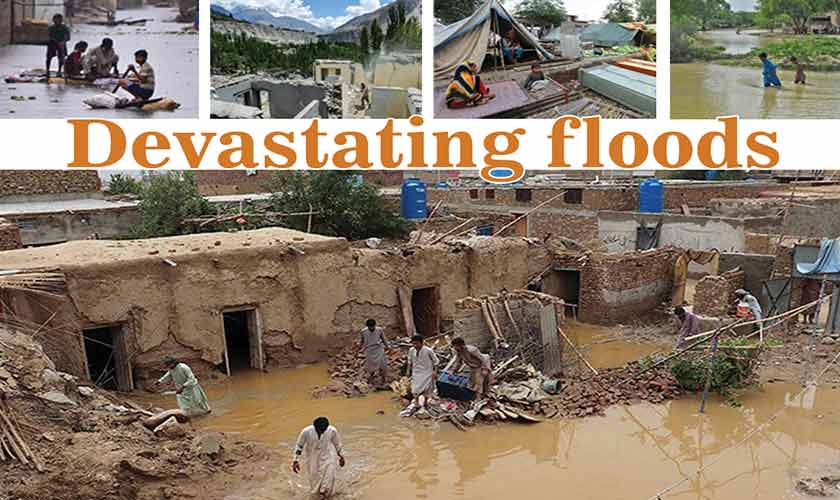Adnan Aamir
@iAdnanAamir
The scale of devastation in Balochistan is such that the rehabilitation is said to be beyond the governments’ capacity.Murad Ali, a 36-year-old father of five, lives in Lakhra tehsil of Lasbela district. The homes of Ali and many of his relatives have been destroyed by flood water. “Fifty houses in my neighbourhood have been damaged,” he says. To top it off, he has fallen ill on account of shortages of safe drinking water and food. He says there are no functional medical health facilities or doctors in the area. Tens of thousands of people in Balochistan have been hit by the natural calamity. Elderly people tell this scribe that they have never seen rainfall like this in Balochistan. The rain has resulted in flash floods in many areas. Lack of disaster preparedness, poor governance and corruption have aggravated the devastation. According to the Provincial Disaster Management Authority (PDMA), the floods have resulted in 230 deaths; another 98 people being wounded in accidents caused by the rains and floods. Almost 27,000 houses have been damaged, 710 kilometres of roads have been rendered useless; 18 bridges have collapsed. Moreover, half a million livestock have perished and crops on more than 200,000 acres have been destroyed. Almost all districts of Balochistan have been affected. The last time Balochistan experienced massive floods was in 2010. But the damage suffered then pales in comparison with the damage caused by the floods this year. Lasbela, Balochistan’s coastal district located near Karachi, has been badly hit by the floods. Roads passing through Lasbela, most prominently the Quetta-Karachi Highway, has been blocked for many. Former chief minister Jam Kamal, one of the MPAs from Lasbela, has decried the government inaction. He has been using social media to highlight the lack of relief work in Lasbela, allegedly to settle political scores. The provincial government has been severely criticised for its failure to act timely to help the populace. Chief Minister Abdul Quddus Bizenjo has been criticised for his long stay in Islamabad considering the province is in a state of crisis. The PDMA has also been castigated for its failure to help those in need. By way of a response, the PDMA has banned the entry of a local journalist in its office. The journalist had criticised the performance of the PDMA in a TV interview.Rains during the early monsoon spells last month had caused flash floods in several areas and destroyed dozens of water storage dams. It soon came out that the damage was caused by poor construction quality. This was seen as an indicator of corruption in the award of construction contracts and regenerated the debate on the need to take strict measures to curb corruption in the public sector.The parliamentary opposition in Balochistan is also nowhere to be seen in this time of crisis. The BAP government has been ruling the province without a stiff opposition. It is alleged that the BNP-Mengal and the JUI are informally supporting it. The floods had started wreaking havoc in Balochistan at the beginning of August. However, most of the disaster escaped the media’s attention. Eventually, the scale of devastation was revealed on social media. This then compelled the administration to take this calamity seriously. Government institutions, federal as well as provincial, were quite slow in starting rescue and relief activities. One instance of social media working for the people in distress was the Kana Yaari singer of Coke Studio fame, Wahab Bugti. Bugti’s home was washed away by floods in his native Dera Bugti town. He was seen on social media holding his children next to the collapsed walls and flood water. The report on social media generated sympathy and calls to help him and others like him. The family was then moved to Dera Murad Jamali. He is now being taken care of, thanks to his fame and social media support. Thousands of people similarly affected by the rains and floods have not been that lucky and still await help.Voluntary groups and civil society organisations have tried to help the people in need. Almost 13,000 affected people have received some form of aid from such bodies. Social workers in many parts of Balochistan are using social media to collect donations, which they are using to help people in their areas. The informal support mechanism has been way more effective in helping people than some well-established government bodies. Qaisar Roonjha heads the Welfare Association for New Generation (WANG), a civil society organisation that has been helping the flood affected in rural areas of Lasbela. He tells The News on Sunday that his team of volunteers has been providing relief on the ground. “Along with providing relief, we have been paving the way for other relief organisations to continue their work in the area,” Roonjha says. Calls for international humanitarian bodies to help out have increased following complaints of the government failure. Under pressure, the government has agreed to host a donor conference. Given the scale of devastation, many people believe that the rehabilitation of the affected people is beyond the capacity of the provincial and federal governments.
https://www.thenews.com.pk/tns/detail/985707-fleeing-responsibility


No comments:
Post a Comment